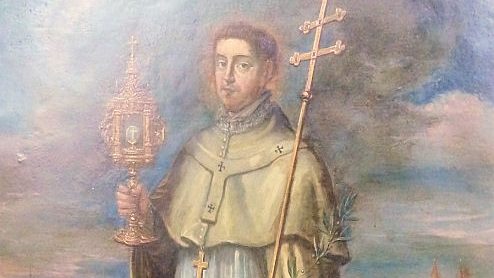St. Norbert was born around the year 1080, in Xanten, Germany, to a high-ranking family with ties to the imperial court. As a young man, Norbert was extremely intelligent, and was marked for high office in the Church, the state, or both.
Norbert was ordained as a subdeacon, and eventually served an appointment with the powerful Archbishop of Cologne, and then the German Emperor Henry V. Although his work involved distributing aid to the poor, Norbert lived a pleasurable, luxurious life, with no particular personal piety.
In 1110, he accompanied Henry V on a trip to Rome. The pope and the emperor were fighting over the right to choose the Church’s clergy and control property. Although their negotiations failed, Norbert was moved by the pope’s argument that the Church must govern himself. He also saw his emperor imprison the pope in order to get his way.
This was not enough to prompt immediate reform for Norbert, until he came close to death about two years later. While riding on horseback, he was caught in a storm and nearly killed by a lightning bolt. His frightened horse threw him, and Norbert lay unconscious for a long time. After this experience, he quit his work, and went to a monastery to pray and discern God’s call.
At the age of 35, he felt called to the priesthood. He gave all his wealth to the poor and began to work as a barefoot, begging pilgrim, trying to reform those who lived as he once had.
Pope Callixtus II gave Norbert permission to live as an itinerant preacher, and asked him to found a religious order so that others could follow his example. Norbert settled in northern France with a small group of disciples, who lived according to the Rule of St. Augustine. On Dec. 25, 1121, they were established as the Canons Regular of Premontre, also known as the Norbertines.
Norbert also established a women’s branch of the order before returning to Germany to preach. He founded a lay branch, the Third Order of St. Norbert, and his work spread throughout many Northern European dioceses.
Norbert was eventually chosen as Archbishop of Magdenurg. He worked hard to reform the morally and financially bankrupt diocese, but was only partially successful, with three attempts made on his life. He traveled to Rome in 1130 to resolve a papal succession dispute, and then became a close advisor to the new emperor of Germany, Lothar.
When his health began to fail, Norbert returned to Magdeburg, dying there on June 6, 1134. Pope Gregory XIII canonized St. Norbert in 1582. Currently the Norbertines are present in 25 nations around the world.

